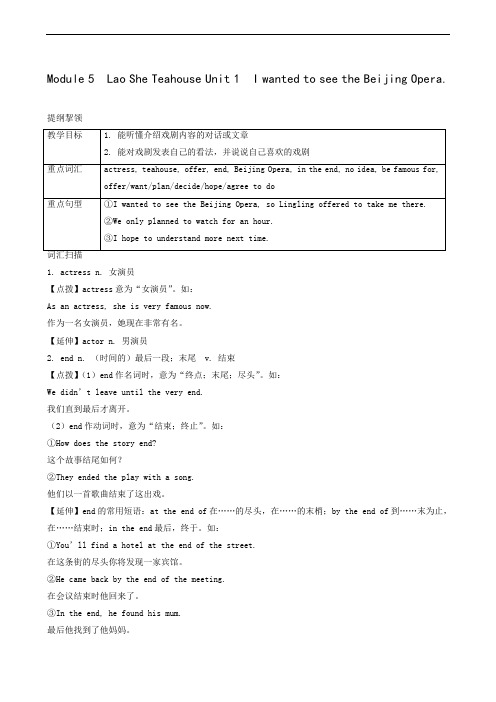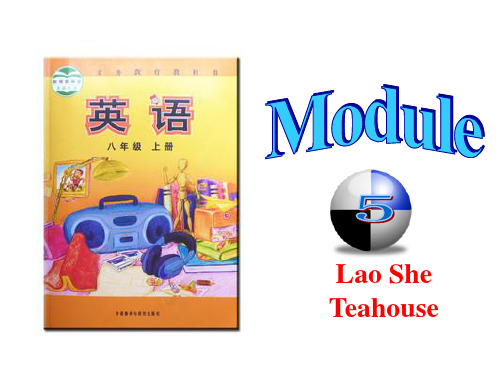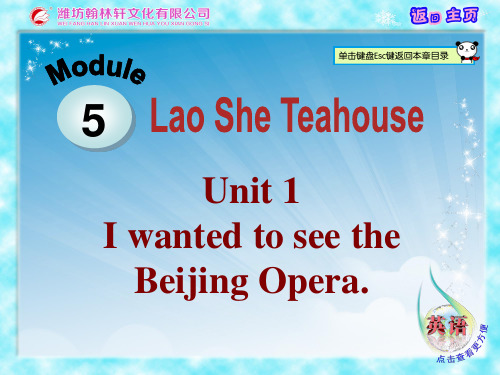Unit 1 I wanted to see the Beijing Opera课件06
- 格式:ppt
- 大小:2.48 MB
- 文档页数:20

Module 5 Lao She Teahouse Unit 1 I wanted to see the Beijing Opera. 提纲挈领1. actress n. 女演员【点拨】actress意为“女演员”。
如:As an actress, she is very famous now.作为一名女演员,她现在非常有名。
【延伸】actor n. 男演员2. end n. (时间的)最后一段;末尾 v. 结束【点拨】(1)end作名词时,意为“终点;末尾;尽头”。
如:We didn’t leave until the very end.我们直到最后才离开。
(2)end作动词时,意为“结束;终止”。
如:①How does the story end?这个故事结尾如何?②They ended the play with a song.他们以一首歌曲结束了这出戏。
【延伸】end的常用短语:at the end of在……的尽头,在……的末梢;by the end of到……末为止,在……结束时;in the end最后,终于。
如:①You’ll find a hotel at the end of the street.在这条街的尽头你将发现一家宾馆。
②He came back by the end of the meeting.在会议结束时他回来了。
③In the end, he found his mum.最后他找到了他妈妈。
句型透视1. You know, I wanted to see the Beijing Opera, so Lingling offered to take me there. 你知道的,我想看京剧,所以玲玲主动提出带我去那里。
【点拨】(1)want是动词,意为“想;想要”。
常用于以下结构:1)want sth.想要某物。
如:He wants a book.他想要一本书。


Module 5 Lao She TeahouseUnit 1 I wanted to see the Beijing Opera.一、教学目标1. Function: Talking about intentions and plans.2. Structure: Infinitive struc tures : infinitives as objects; verbs followedby infinitives.3. Skills:1) Listening and understanding familiar topics (Beijing Opera) findingspecific information.2) Describing intentions and plans in simple language.二、教学重点及难点:Infinitive structures : infinitives as objects; verbs followed by infinitives.三、教学设计:Unit 1 I wanted to see the Beijing Opera.Ⅰ.Teaching type:Listening and spe akingⅡ.Teaching method:Communicative approachⅢ.Teaching aims:1. Key vocabulary: actress, teahouse, offer, end, in the end,no idea2. Key structures: Infinitive structures (1): infinitives as objects; verbsfollowed by infinitives.3. Key sentences:1) How was it?2) Yo u know, …3) That’s the main thing.4) No idea.5) — Do you want to see the Beijing opera?— Yes, I’d love to.6) — D o you want to come to Lao She T eahouse with me?— Yes, pleas e. I’d like to go with you.7) I w anted to see the Beijing Opera.8) Lingling offered to take me there.Ⅳ. Teaching aids:Tape recorder, PPTⅤ.Teaching StepsStep 1. Warming-up1). Show some pictures.2). Look at the pictures, and say something about the pictures.3). Introduce the new words.4). Talk about Lao She Teahouse and Lao She.Step 2. Work in pairs.Ask and answer about what you can do at Lao She Teahouse in pairs.Step 3. Listening practice.1. Ask the students to listen to the tape and then fill in the blanks. (L:Lingling B: Betty)L: Hi, Betty.B: Hi, Lingling. I’d _____ to see the traditional Beijing Opera.L: Do you want to come to Lao She ______ with me?B: What’s Lao She Teahouse?L: You can ______ ______ the Beijing Opera there and _____ ______at the same time.B: Yes, please. I’d like to go with you. You can tell me what’s happening. L: Yes, it’s quite __________ to understand the story. Just watch the actors and actresses, listen to the music and try to _______ it.2. Check the answers:Step 4. Listening practice.1.Listen and finish the ex ercises.1). Why did Lingling take Betty to the teahouse?Because she ______ ______ see the Beijing Opera.2). What did Betty and Lingling do at the teahouse?They drank ______ and ______ an opera .3). How long did Lingling and Betty plan to watch the traditional BeijingOpera?A. For an hourB. for two hoursC. For three hours2. Check the answers:Step 5. Reading time:1. Read the conversation and choose the correct answers.1). Betty and ____ went to Lao She Teahouse last night.A. TonyB. LinglingC. Be tty2). Betty ho pe to _______ ne xt time.A. understand moreB. understanding moreC. understand less3). — How long did they stay in the end? — They stayed for ___. A. 3 hours B. 2 hours C. 1 hour4). Lao She is a(n) ________A. great actorB. great waiterC. great writer2. Read the conversation again and find out infinitives.3. Ask the students to read the conversation again and then complete thepassage.Betty’s BlogThe visit to the Lao She TeahouseLingling and I went to Lao She Teahouse last night. I wanted ________ the Beijing opera, so Lingling __________________ me there,we drank tea and _______ an opera . I t is hard for me __________________ , but the actors and actresses are ____________. At first, we planned _____________ for an hour, but in the end, we stayed ____________________. The main thing is that it was ______________, I hope_________________________ next time. Because the tea house is very famous, I asked Lingling ___________ me there. Lingling told me that Lao She is a famous ________, and he ___________________ his play Teahouse. We really had ______________________.4. Check the answers.5. Read the passage by themselves.Step 6.Summary:Step 7 H omework:Writing:假如你昨天参加了你的朋友Bill的生日聚会,而且是你的另一个朋友Jerry主动提出带你去的,设定一个过生日的情景,自编一段对话,尽可能多的用动词不定式。



Module 5 Lao She Teahouse一、教学内容:Unit 1 I wanted to see the Beijing Opera.二、课型:Listening and speaking三、教学目标:1、能正确运用本单元的词汇及短语:actress, teahouse, offer, end, in the end, no idea2、能听懂有关京剧的对话,了解老舍茶馆,并感知动词不定式作宾语的表达。
3、能用动词不定式表达自己的意图和计划, 并培养学生对京剧中国传统文化的兴趣和爱好,增强其民族自豪感。
四、教学重难点:1、本单元要求掌握的单词和词组。
2、掌握动词不定式作宾语的用法,并能用动词不定式表达自己的意图和计划等。
五、教学准备:本课指导学生通过听力获取信息,培养学生听力技能。
课堂上采用多媒体手段辅助教学,在轻松愉快的氛围中,在较真实的语境下,并联系学生生活实际,结合已有的知识和经验,运用所学的语言基础知识自我学习、互相学习,让学生在语言实践中相互启发、生成,体验成功。
培养学生的合作精神,发展其思维和想象等能力。
在教学过程中,采用多媒体手段辅助教学,利用各种图片和习题任务贯穿整个教学过程。
因此,本节课需准备:PPT课件、挂图、录音机、课堂练习表格、奖品。
六、预习要求:1、根据音标自学本课新单词;2、查找相关资料,找出你认为本课较重要的语言点和短语。
达标训练题一、单项选择()1. He stayed at home for ________ hour.A. aB. anC. theD. \()2.The old man was badly ill and we _____ him _____ hospital right away.A. take; toB. bring; toC. took; toD. brought ; to ()3. It is difficult for the boy _______ English well.A. learnB. learnsC. to learnD. learning ()4. – Don’t forget _______ your homework.- OK. I’ll do it right now.A. doingB. doC. to doD. did()5. Would you please show me the way _________ the bank?A. inB. forC. withD. tot二、根据汉语完成句子,每空一词。
Module 5 Lao She TeahouseUnit 1 I wanted to see the Beijing Opera.教学目标【知识目标】1. 能正确运用本单元的词汇及短语:actress, teahouse, offer, end, in the end, no idea等。
2. 学习动词不定式作宾语的表达。
【能力目标】1. 能听懂有关京剧的对话,了解老舍茶馆。
2. 能用动词不定式表达自己的意图和计划。
【情感态度目标】培养学生对京剧中国传统文化的兴趣和爱好,增强其民族自豪感。
教学重难点【教学重点】本单元要求掌握的单词和词组。
【教学难点】掌握动词不定式作宾语的用法,并能用动词不定式表达自己的意图和计划等。
教学过程Step 1 Warming-up1. Enjoy a play: Lao She Teahouse2. Show some pictures.3. Look at the pictures, and talk something about the pictures.4. Introduce the new words.5. Learn the new words.6. Read the new words.Step 2 Work in pairs.3. Work in pairs. Use the words from the box to help you.Step 3 Listening practice.1. Ask the students to read through the sentences in Activity2.1) Betty often sees / wants to see some traditional Beijing opera.2) Betty knows / doesn’t know Lao She Teahouse.3) Lingling says that the opera is easy / difficult to understand.2. Play the recording once without stopping.3. Listen and underline the correct words.4. Play the recording again and ask the whole class to check with a partner.5. Check the answers:Keys: 1. wants 2. doesn’t know 3. difficultStep 4 Listen and read.1. Show some pictures, and ask the students to talk about them.2. Ask the students to read the conversation silently.3. Play the recording and ask the students to listen and read the conversation.4. Read the conversation.5. Act it out.6. Learn “Everyday English”1) How was it? 2) You know, …3) That’s the main thing.4) No idea.Step 5 Check the true sentences.1. Ask the students to read the conversation again.2. Now check the true sentences.1) Tony went to Lao She Teahouse with Betty and Lingling.2) Betty understood the opera.3) Lingling and Betty stayed longer than they planned.4) Betty enjoyed the opera.5) Betty would like to go to the opera again.6) Betty knew about Lao She before she went to the teahouse.3. Ask the students to check with a partner.4. Check the answers:Keys: 1. × 2. × 3. √ 4. √ 5. √ 6. ×Step 6 Complete the passage.3. Complete the passage with the correct form of the words from the box.4. Ask the students to check with a partner.5. Check the answers:Keys: 1. offered 2. difficult 3. actresses 4. end 5. mainStep 7 Listen and repeat.1. Play the recording once without stopping.2. Play the recording again and ask the whole class to repeat.1) — Do you want to see the Beijing opera?—Yes, I’d love to.2) — Do you want to come to Lao She Teahouse with me?—Yes, please. I’d like to go with you.3. Ask the students to listen and mark the intonation.4. Now listen again and repeat.Step 8 Work in pairs.1. Ask the students to read the conversations in Activity 5 aloud.2. Make true sentences.1) I want to ___________ next week.2) They offered to ___________.3) I hope to ___________ one day.4) My parents agree to ____________ on Saturday.3. Talk about something you’d like to do or see.— I want to go to Xinjiang and ride horses.—…Step 9 Important and difficult points1. — Who is Lao She? 老舍是谁?— No idea. 不知道。